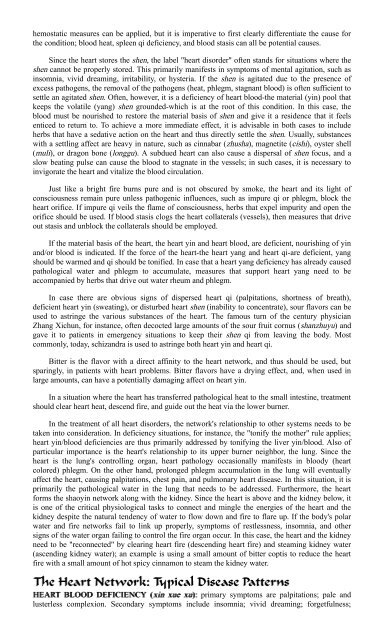Create successful ePaper yourself
Turn your PDF publications into a flip-book with our unique Google optimized e-Paper software.
hemostatic measures can be applied, but it is imperative to first clearly differentiate the cause for<br />
the condition; blood heat, spleen qi deficiency, and blood stasis can all be potential causes.<br />
Since the heart stores the shen, the label "heart disorder" often stands for situations where the<br />
shen cannot be properly stored. This primarily manifests in symptoms of mental agitation, such as<br />
insomnia, vivid dreaming, irritability, or hysteria. If the shen is agitated due to the presence of<br />
excess pathogens, the removal of the pathogens (heat, phlegm, stagnant blood) is often sufficient to<br />
settle an agitated shen. Often, however, it is a deficiency of heart blood-the material (yin) pool that<br />
keeps the volatile (yang) shen grounded-which is at the root of this condition. In this case, the<br />
blood must be nourished to restore the material basis of shen and give it a residence that it feels<br />
enticed to return to. To achieve a more immediate effect, it is advisable in both cases to include<br />
herbs that have a sedative action on the heart and thus directly settle the shen. Usually, substances<br />
with a settling affect are heavy in nature, such as cinnabar (zhusha), magnetite (cishi), oyster shell<br />
(muli), or dragon bone (longgu). A subdued heart can also cause a dispersal of shen focus, and a<br />
slow beating pulse can cause the blood to stagnate in the vessels; in such cases, it is necessary to<br />
invigorate the heart and vitalize the blood circulation.<br />
Just like a bright fire burns pure and is not obscured by smoke, the heart and its light of<br />
consciousness remain pure unless pathogenic influences, such as impure qi or phlegm, block the<br />
heart orifice. If impure qi veils the flame of consciousness, herbs that expel impurity and open the<br />
orifice should be used. If blood stasis clogs the heart collaterals (vessels), then measures that drive<br />
out stasis and unblock the collaterals should be employed.<br />
If the material basis of the heart, the heart yin and heart blood, are deficient, nourishing of yin<br />
and/or blood is indicated. If the force of the heart-the heart yang and heart qi-are deficient, yang<br />
should be warmed and qi should be tonified. In case that a heart yang deficiency has already caused<br />
pathological water and phlegm to accumulate, measures that support heart yang need to be<br />
accompanied by herbs that drive out water rheum and phlegm.<br />
In case there are obvious signs of dispersed heart qi (palpitations, shortness of breath),<br />
deficient heart yin (sweating), or disturbed heart shen (inability to concentrate), sour flavors can be<br />
used to astringe the various substances of the heart. The famous turn of the century physician<br />
Zhang Xichun, for instance, often decocted large amounts of the sour fruit cornus (shanzhuyu) and<br />
gave it to patients in emergency situations to keep their shen qi from leaving the body. Most<br />
commonly, today, schizandra is used to astringe both heart yin and heart qi.<br />
Bitter is the flavor with a direct affinity to the heart network, and thus should be used, but<br />
sparingly, in patients with heart problems. Bitter flavors have a drying effect, and, when used in<br />
large amounts, can have a potentially damaging affect on heart yin.<br />
In a situation where the heart has transferred pathological heat to the small intestine, treatment<br />
should clear heart heat, descend fire, and guide out the heat via the lower burner.<br />
In the treatment of all heart disorders, the network's relationship to other systems needs to be<br />
taken into consideration. In deficiency situations, for instance, the "tonify the mother" rule applies;<br />
heart yin/blood deficiencies are thus primarily addressed by tonifying the liver yin/blood. Also of<br />
particular importance is the heart's relationship to its upper burner neighbor, the lung. Since the<br />
heart is the lung's controlling organ, heart pathology occasionally manifests in bloody (heart<br />
colored) phlegm. On the other hand, prolonged phlegm accumulation in the lung will eventually<br />
affect the heart, causing palpitations, chest pain, and pulmonary heart disease. In this situation, it is<br />
primarily the pathological water in the lung that needs to be addressed. Furthermore, the heart<br />
forms the shaoyin network along with the kidney. Since the heart is above and the kidney below, it<br />
is one of the critical physiological tasks to connect and mingle the energies of the heart and the<br />
kidney despite the natural tendency of water to flow down and fire to flare up. If the body's polar<br />
water and fire networks fail to link up properly, symptoms of restlessness, insomnia, and other<br />
signs of the water organ failing to control the fire organ occur. In this case, the heart and the kidney<br />
need to be "reconnected" by clearing heart fire (descending heart fire) and steaming kidney water<br />
(ascending kidney water); an example is using a small amount of bitter coptis to reduce the heart<br />
fire with a small amount of hot spicy cinnamon to steam the kidney water.<br />
HEART BLOOD DEFICIENCY (xin xue xu): primary symptoms are palpitations; pale and<br />
lusterless complexion. Secondary symptoms include insomnia; vivid dreaming; forgetfulness;

















